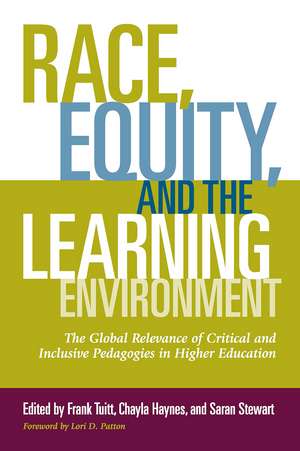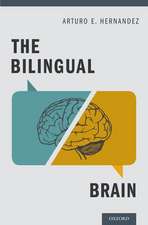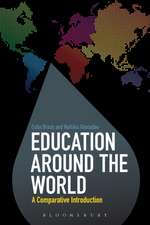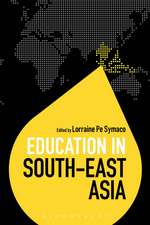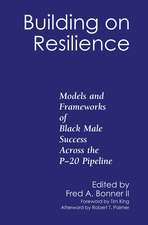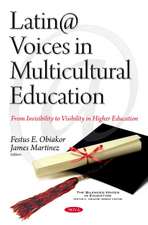Race, Equity, and the Learning Environment: The Global Relevance of Critical and Inclusive Pedagogies in Higher Education
Editat de Frank Tuitt, Chayla Haynes, Saran Stewarten Limba Engleză Paperback – 5 mai 2016
| Toate formatele și edițiile | Preț | Express |
|---|---|---|
| Paperback (1) | 305.83 lei 6-8 săpt. | |
| Taylor & Francis – 5 mai 2016 | 305.83 lei 6-8 săpt. | |
| Hardback (1) | 1001.84 lei 6-8 săpt. | |
| Taylor & Francis – 11 mai 2016 | 1001.84 lei 6-8 săpt. |
Preț: 305.83 lei
Nou
Puncte Express: 459
Preț estimativ în valută:
58.53€ • 61.03$ • 48.64£
58.53€ • 61.03$ • 48.64£
Carte tipărită la comandă
Livrare economică 20 martie-03 aprilie
Preluare comenzi: 021 569.72.76
Specificații
ISBN-13: 9781620363409
ISBN-10: 1620363402
Pagini: 264
Dimensiuni: 152 x 229 x 15 mm
Greutate: 0.36 kg
Ediția:1
Editura: Taylor & Francis
Colecția Routledge
Locul publicării:Oxford, United Kingdom
ISBN-10: 1620363402
Pagini: 264
Dimensiuni: 152 x 229 x 15 mm
Greutate: 0.36 kg
Ediția:1
Editura: Taylor & Francis
Colecția Routledge
Locul publicării:Oxford, United Kingdom
Public țintă
PostgraduateNotă biografică
Frank Tuitt is the Senior Advisor to the Chancellor and Provost on Diversity and Inclusion at the University of Denver and Associate Professor of Higher Education in the Morgridge College of Education. Dr. Tuitt’s research explores topics related to access and equity in higher education; teaching and learning in racially diverse college classrooms; and diversity and organizational transformation. Dr. Tuitt is a co-editor and contributing author of the books Race and Higher Education: Rethinking Pedagogy in Diverse College Classrooms, and Contesting the Myth of a Post-Racial Era. Chayla Haynes is Assistant Professor of Higher Education and Student Affairs Leadership at the University of Northern Colorado. Her research centers on innovations in college teaching, creating transformative and identity affirming learning environments, and applying Critical Race Theory (CRT) to postsecondary contexts and problems. Her most recent work is featured in The Sage Encyclopedia of Intercultural Competence, the National Association of Student Affairs Professionals Journal, and includes the co-edited volume entitled Interrogating Whiteness and Relinquishing Power: White Faculty's Commitment to Racial Consciousness in STEM Classrooms. Saran Stewart is a Lecturer of Comparative Higher Education in the Faculty of Humanities and Education at the University of the West Indies, Mona Campus. She is also the Coordinator for the M.A. in Higher Educational Management program and a Research Specialist in the Research and Grants Unit in the School of Education. Her work has been published in the Journal of Diversity in Higher Education, Journal of Student Affairs, Postcolonial Directions in Education Journal and the Applied Anthropologist Journal. Dr. Stewart most recently, received the International Scholars Award at the Research in Education Symposium from the Government of the Republic of Trinidad and Tobago and the Inter-American Development Bank. Lori D. Patton, Ph.D.
Cuprins
Foreword—Lori D. Patton Acknowledgements Introduction. Critical and Inclusive Pedagogy. Why the Classroom Is All It’s Cracked Up to Be—Chayla HaynesPart One. How We Think About Our Work 1. Advancing a Critical and Inclusive Praxis. Pedagogical and Curriculum Innovations for Social Change in the Caribbean—Saran Stewart 2.Pursuing Equity Through Diversity. Perspectives and Propositions for Teaching and Learning in Higher Education—Liza Ann Bolitzer, Milagros Castillo-Montoya, and Leslie A. Williams 3. A Democratic Pedagogy for a Democratic Society. Education for Social and Political Change (T-128)—Eileen de los Reyes, Hal Smith, Tarajean Yazzie-Mintz, Yamila Hussein, and Frank Tuitt With José Moreno, Anthony De Jesús, Dianne Morales, and Sarah Napier Part Two. How We Engage In Our Work 4. Radical Honesty. Truth-Telling as Pedagogy for Working Through Shame in Academic Spaces—Bianca C. Williams 5. Using the Barnga Card Game Simulation to Develop Cross-Cultural Thinking and Empathy—David S. Goldstein 6. Campus Racial Climate and Experiences of Students of Color in a Midwestern College—Kako Koshino 7. Humanizing Pedagogy for Examinations of Race and Culture in Teacher Education—Dorinda J. Carter Andrews and Bernadette Castillo Part Three. Measuring the Impact of Our Work 8. Dehumanizing and Humanizing Pedagogies. Lessons From U.S. Latin@ and Undocumented Youth Through the P-16 Pipeline—Lisa Martinez, Maria del Carmen Salazar, and Debora M. Ortega 9. De-Racializing Japaneseness. A Collaborative Approach to Shifting Interpretation and Representation of “Culture” at a University in Japan—Ioannis Gaitanidis and Satoko Shao-Kobayashi 10. Unsung Heroes. Impact of Diverse Administrators on the Creation of Transformative, Affirming, and Equitable Learning Environments—Stella L. Smith 11. Critical Pedagogy and Intersectional Sexuality. Exploring Our Oppressions and Privileges Through Reflexivity, Responsibility, and Resistance—Haneen S. Ghabra, Sergio F. Juarez, Shanna K. Kattari, Miranda Olzman, and Bernadette Marie Calafell Conclusion. Inclusive Pedagogy 2.0. Implications for Race, Equity, and Higher Education in a Global Context—Frank Tuitt The Editors and Contributors
Recenzii
"What has become increasingly apparent, and therefore in need of redress, is the lack of racial equity in pedagogical frameworks and practices. Race, Equity, and the Learning Environment: The Global Relevance of Critical and Inclusive Pedagogies in Higher Education brings these matters to the fore and argues that critical and inclusive pedagogies can, when employed effectively, offer a way forward."
Reflective Teaching (Wabash Center)
"Race, Equity and the Learning Environment could not be more timely and relevant for those who work in higher education. This work is a direct confrontation of race and racism and offers excellent examples from practice and research for how to center these important topics in the classroom. Readers are pushed to think in transformative ways about how to teach race and racism as well as confront their own power and privilege through critical self-examination. The urgency in this work to disrupt racist’s practices is needed and faculty at every stage in their career would benefit tremendously from the strategies discussed in the book."
Sharon Fries-Britt, Professor of Higher Education, University of Maryland
From the Foreword:
“This volume bridges the gap from thought to action, providing the necessary context for educators around the world to either embrace or recommit to centering race in postsecondary classrooms and engaging in necessary conversations to ensure that students do not leave our institutions the way they came. I applaud the editors of this book as they dare to move beyond the conversation to engage in teaching and learning that reflects how progressive racial understandings promote equity in higher education.”
Lori Patton Davis, Associate Professor, Higher Education and Student Affairs, IUPUI
Reflective Teaching (Wabash Center)
"Race, Equity and the Learning Environment could not be more timely and relevant for those who work in higher education. This work is a direct confrontation of race and racism and offers excellent examples from practice and research for how to center these important topics in the classroom. Readers are pushed to think in transformative ways about how to teach race and racism as well as confront their own power and privilege through critical self-examination. The urgency in this work to disrupt racist’s practices is needed and faculty at every stage in their career would benefit tremendously from the strategies discussed in the book."
Sharon Fries-Britt, Professor of Higher Education, University of Maryland
From the Foreword:
“This volume bridges the gap from thought to action, providing the necessary context for educators around the world to either embrace or recommit to centering race in postsecondary classrooms and engaging in necessary conversations to ensure that students do not leave our institutions the way they came. I applaud the editors of this book as they dare to move beyond the conversation to engage in teaching and learning that reflects how progressive racial understandings promote equity in higher education.”
Lori Patton Davis, Associate Professor, Higher Education and Student Affairs, IUPUI
Descriere
At a time of impending demographic shifts, faculty and administrators in higher education around the world are becoming aware of the need to address the systemic practices and barriers that contribute to inequitable educational outcomes of racially and ethnically diverse students.
